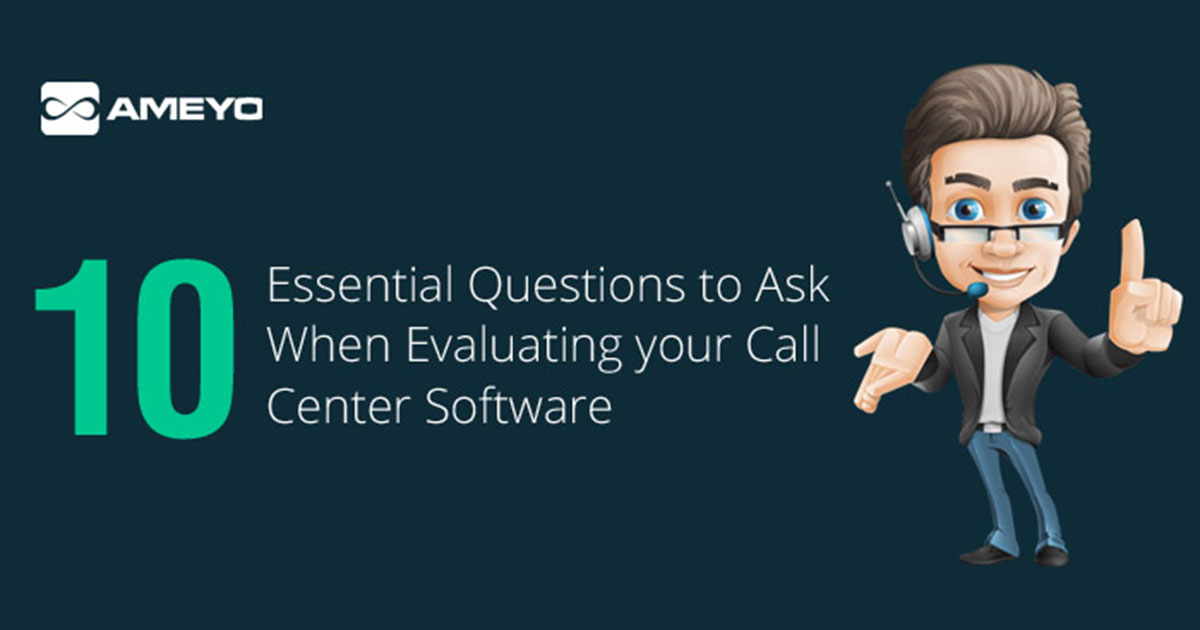Selecting the right call center software is serious business, because the quality of service you offer to your customers highly depends on the technology you have. And since the market is packed with customer contact system software providers of various types – on-premise, cloud, hosted and browser-based technologies, it can be a herculean task to sift through the options and find the right solution that fits your needs.
With several providers fighting for your business, you are likely to come under a barrage of sales pitches. Careful evaluation of call center software providers will ensure that you are not stuck with a solution that is not a good fit for your business. So I have compiled a list of 10 questions that could help you in evaluating your current customer contact system or a potential software:
#1. Is there any Hardware required to enable the call center application to function?
The requirement to purchase hardware puts a burden on your business. It can severely complicate implementation and support. Hardware-based applications causes your call center to lose portability, extensibility, and necessitates a significant upfront monetary investment and ongoing maintenance cost.
#2. Is your call center management system Scalable?
When you on-board new agents, is it taking a good deal of time to bring the team up-and-running? This is a critical criteria for evaluation, since you have to ensure that your technology does not stall growth when your business demands it. Your customer service solution should be able to accommodate that growth, by ensuring your ensuing projects are scalable to existing call center infrastructure, platform, and products.
#3. Is your technology Reliable?
Is your service provider failing to live up to their guarantees of availability, reliability, security and uptime? Have you seen your fair share of unplanned crashes? Are your call center agents fielding too many customer complaints about the call center being inaccessible, calls being dropped, etc. If your software does not live up to your SLAs, it is time to move your operations to a new solution.
#4. Does your solution Integrate with Business Tools and Applications?
Do your agents use CRM, help desk software and ticketing technology but none of them are integrated with your call center technology? This would mean that your agents consume a fair share of time inputting redundant data into multiple systems. Call centre system softwares should be two-way synchronized with third party applications and tools to streamline agent workflow and equip them with concrete customer information.
#5. Does your online call center software support Multichannel interactions management?
Even if you start with telephony only, you may want to make sure that your provider support multimedia interactions if you ever decide to open up those channels for your prospects and clients. Your software should be able to manage all types of media using the same routing engine.
#6. Is your technology open to Customizations?
To what extent can your software adapt and successfully run system customizations? Your business processes must be in sync with your customer service solution to streamline call center operations and ensure team collaboration. The solution should be easily customizable to design automation rules, routing parameters, etc. as per business requirements.
#7. Does your software provide critical data on its Reporting and analytics tool?
Are your managers and supervisors able to make data-driven decisions based on the reports generated by your call centre system software? Empowering your managers with real-time and historical data to make informed decisions positively impact KPIs. For managers, the reporting dashboard is their most important tool in their tool belt. If your call center software fails to generate such reports that are easily interpretable and actionable, it is time to move to one that can.
#8. Is your solution Flexible to making changes on the fly?
Is it difficult to adapt your software to changing business requirements? You, not your service provider must be able to have control over your call center. Creating new prompts in your marketing campaigns, amending IVR flows, etc. are few functions that you should be able to handle without your service provider interrupting.
#9. Do your agents find the software Helpful and Easy To Use?
Have you been fielding a lot of complaints from your agents about your call center software solution. Do they say that the software lacks the functionality to help them? Is the user-interface too complex to understand? Do they struggle with a few features? If you think their pain-points are valid and credible, it is reason enough to leverage a solution that meets their needs. After all, agents are the ones that use the software day in and day out.
#10. Does your software support Blended Agents?
Are your inbound agents able to process outbound calls, and your outbound agents incoming calls? This is a key feature to look for in a customer service solution, since this directly impacts agent productivity and call center efficiency. It allows the efficient use of staffing and available resources. When inbound traffic is slow and agents are idle, with a click of a button, your software should be able to ramp up the specified outbound campaigns. And when the traffic increases, your agents should be able to switch back.
After you have honestly answered these 10 questions, and if they lead you to believe that it is time to switch – Make that decision today. A technology that does not fit your business needs significantly impacts the service you provide and your bottom line.


